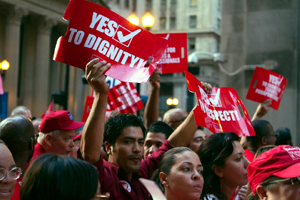Saying It’s Not about the Money, Chicago Teachers Inch Closer to Strike

The Chicago Teachers Union stepped closer to a strike as it voted today to reject an arbitrator’s recommendations in the contract dispute with “Mayor 1%” Rahm Emanuel. Though the arbitrator's economic proposals are far more favorable than the city’s, CTU leaders say they advised delegates to reject the report. The union's House of Delegates voted it down unanimously.
Kristine Mayle, CTU financial secretary, says she opposes the report because it fails to take into account the full scope of the union’s concerns. “It doesn’t address the education issues that we’re concerned about,” she said.
Independent arbitrator Edwin Benn proposed a 15 percent raise to match the 20 percent increase in the school day that Emanuel and the school board want to implement.
Benn also called for preserving step increases for years of service and advanced degrees. His recommendations are not binding.
Jim Cavallero, a high school special education teacher and union delegate, stressed that quality of education issues like smaller classes, computers in the classroom, and nursing and social-work services for students matter far more than the money.
The school board, none of whose members are elected, also rejected the report’s findings today, in a closed session. Emanuel slammed the report as “not connected to reality,” and the schools CEO said raises for teachers would necessitate layoffs and cutbacks.
Scheduled bargaining sessions will continue as planned. But since both the board and the union have rejected the report, the CTU is now free to strike after 30 days.

SUPPORT LABOR NOTES
BECOME A MONTHLY DONOR
Give $10 a month or more and get our "Fight the Boss, Build the Union" T-shirt.
The arbitrator’s fact-finding report was mandated by last year’s Senate Bill 7, the same law that tied tenure and dismissal to performance evaluations and sought to prevent strikes by requiring a “yes” vote from 75 percent of members. The bill was enacted as yet another roadblock to prevent teachers from striking over contract demands, but last month CTU members registered a 90 percent strike approval.
Mayle said third-party proposals send the wrong message for future bargaining. “We don’t want to set a precedent where some outsider sets the terms of our contract,” she said. “We want to be able to negotiate our contracts.”
Cavallero said the arbitrator’s recommendations surprised him because Chicago politics have become “so anti-union nowadays.” Nonetheless, he says, it just makes sense that people should be fairly compensated for working longer hours.
The CTU wants a proportional pay raise for the longer work day. The union is also calling for smaller class sizes, an increase in wraparound services like school nurses and social workers, and arts and music in all Chicago schools.
The board, however, has refused to engage on quality of education issues. The city says it lacks money to fairly compensate teachers for increased hours. Instead, the board has offered only 2 percent raises for the first two years of the contract. After that, it wants merit pay with evaluations based on student test scores. The city is also trying to get rid of contractual increases for education and experience.
CTU has noted that the city gives nearly $250 million every year in tax abatements to well-connected developers.
Cavallero is hoping the CTU can use the arbitrator’s salary proposals as a bargaining chip for better programs for students and better working conditions for teachers.
